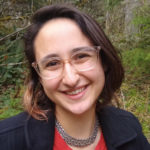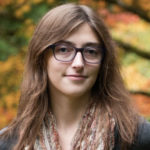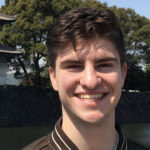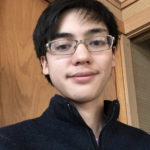Four Harvey Mudd Seniors Receive 2021 NSF Graduate Research Fellowships
April 7, 2021Four Harvey Mudd College seniors—Aria Beaupre, Zoe Bell, John Lentfer and Hunter Whaples—and five recent graduates have been granted the National Science Foundation Graduate Research Fellowship (NSF GRF). In addition, two seniors and one Harvey Mudd alumnus were awarded honorable mentions, a significant academic achievement. For 2021, Harvey Mudd ranks first among all U.S. colleges and universities regarding the number of NSF GRFs awarded on a per-student basis.
The NSF Graduate Research Fellowship Program recognizes and supports outstanding graduate students in NSF-supported science, technology, engineering and mathematics disciplines who are pursuing research-based master’s and doctoral degrees at accredited United States institutions. Program participants are expected to become experts who contribute significantly to research, education and innovation in the STEM fields.

Aria Beaupre ’21 (mathematics) plans to attend Cornell University and conduct research in algebra, number theory and combinatorics. A 2020 Goldwater Scholar, Beaupre is a prolific researcher, author and mentor. With HMC mathematics faculty, she has worked on integrating mathematical modeling into elementary school mathematics curriculum and has studied voting theory. As part of a Research Experience for Undergraduates (REU) at the University of Texas at Tyler, she studied the inverse hull of shifts of finite type and continued this work into her senior thesis. She has served as a math tutor in the College’s Academic Excellence Program and a grader and tutor for Abstract Algebra. In addition to coauthoring a book on math modeling for principals, she’s been honored by the Department of Mathematics with the Alvin White Prize, for contributions to the humanistic side of the mathematics community, and with the Giovanni Borrelli Mathematics Prize.

Zoe Bell ’21 (mathematics) will attend UC Berkeley and study the theoretical foundations of computer science as part of her PhD program in computer science with an emphasis in science and technology studies. Last summer, she studied propositional proof complexity at the University of Washington. She intends to continue studying computational complexity as well as how CS theory can be leveraged to understand the societal connections of computer science in areas like algorithmic fairness. She’s been honored by the Department of Mathematics with the Giovanni Borrelli Mathematics Prize and the Robert James Prize.

John Lentfer ’21 (mathematics) will pursue a PhD in mathematics (combinatorics, number theory and algebra) at UC Berkeley. He has participated in several NSF REU programs. During the HMC Summer Research Program, he studied “Density Functional Theory Studies on Ketal Claisen Rearrangements” with chemistry professors William Daub and Robert Cave. At UCLA, he investigated “Radially Balanced Growth in Neurospora crassa” with Marcus Roper, professor of mathematics, and at Williams College, his primary project was “Completeness of Positive Linear Recurrence Sequences” with Steven J. Miller, professor of mathematics. Lentfer has published three papers, two based on the work done at Williams, and one based on work done with HMC mathematics professor Arthur Benjamin and Thomas Martinez ’21 as part of an independent study in combinatorics. “I also am working on my senior thesis called ‘Tiling Representations of Zeckendorf Decompositions’ with Professor Benjamin, which is expanding on some of the work I did at the Williams REU, but from a more combinatorial perspective,” says Lentfer. After graduate school, Lentfer says he’d like to be a professor and make math more fun and accessible to everyone.

Hunter Whaples ’21 (engineering) plans to study chemical engineering at the Georgia Institute of Technology. During his time at HMC, he has been involved with two named fellowships within the Department of Engineering. As a sophomore on the Riggs Fellowship for Engineering Management team, he worked with Kash Gokli, Oliver C. Field Professor of Manufacturing Practice and Engineering Economics, to lead full manufacturing line renovations for Ametek Ameron and Mission Rubber Company. “Combined, these projects resulted in annualized savings of more than $400,000 and gave me the opportunity to present the case study to the Institute of Industrial and Systems Engineering in fall 2020,” Whaples says. During his junior year, he began working with Nancy Lape, professor of engineering, as part of the Lewis Fellowship for Engineering Professional Practice, to research polymeric nano-composite membranes for gas permeation. Although experimental work was halted due to COVID-19, Whaples continued research with the group by developing molecular dynamics simulations of membranes and helping secure supercomputing resources with the NSF’s XSEDE network. Beyond research, he is vice president of HMC’s chapter of Tau Beta Pi, the National Engineering Honor Society, and is a Machine Shop proctor. He’s also a former HMC Homework Hotline tutor and grader for E79, E182 and E82. He has received departmental honors from engineering and the Johnson Excellence in Engineering Award.
| Name | Major | Research Area |
|---|---|---|
| Anna Barth ’21 | Physics | Condensed matter physics |
| Christina Lau ’21 | Engineering | Electrical and electronic engineering |
| Alum (major) | Research Area | Graduate School |
|---|---|---|
| Charles Dawson ’19 (engineering) | Engineering – artificial intelligence | MIT |
| Sara McAllister ’19 (computer science) | Computer/embedded systems | Carnegie-Mellon University |
| Guadalupe Quirarte ’20 (math/physics) | Engineering – mechanical engineering | Carnegie-Mellon University |
| Hannah Slocumb ’19 (chemistry) | Chemistry – chemical analysis | UC Irvine |
| Leah Stevenson ’19 (chemistry) | Chemistry – chemical measurement & imaging | Caltech |
| Alum (major) | Research Area | Graduate School |
|---|---|---|
| Madeleine Kerr ’20 (physics/theater) | Geosciences – geodynamics | UC San Diego |
The NSF Graduate Research Fellowship Program helps ensure the vitality and diversity of the nation’s base of science and engineering candidates. Fellows are seen as crucial to maintaining and advancing the nation’s technological infrastructure and national security as well as contributing to the economic well being of society at large.
